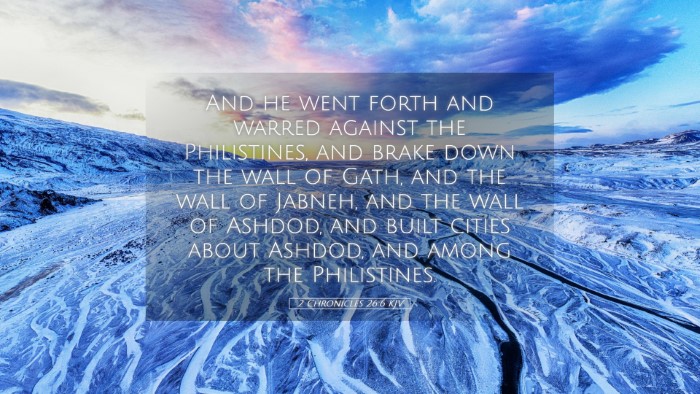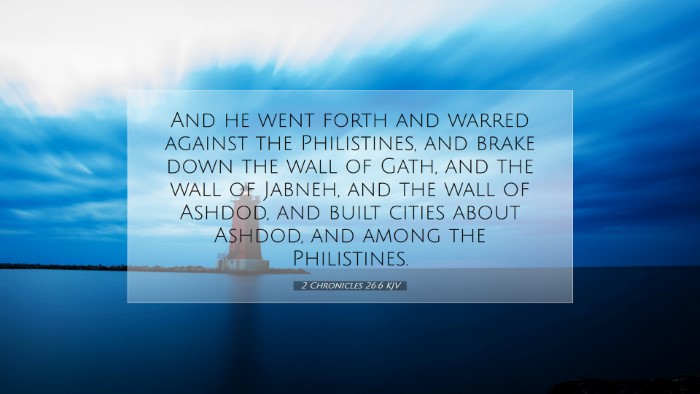Commentary on 2 Chronicles 26:6
Verse Limitations and Historical Context: The verse states, "And he went forth and warred against the Philistines, and broke down the wall of Gath, and the wall of Jabneh, and the wall of Ashdod; and built cities about Ashdod and among the Philistines."
This passage stands as a testament to King Uzziah's military prowess and strategic advancements against formidable foes.
1. Key Themes and Insights
- Theological Themes:
- Divine Providence: The victories achieved by Uzziah can be viewed through the lens of divine favor. His successes are attributed not merely to his military skills but to the sovereignty of God working through him.
- Human Responsibility: This verse underscores the importance of active engagement in the face of challenges. It serves as a reminder that while God's providence is vital, human initiative is required.
- Historical Context: Uzziah's reign, marked by territorial expansion, reflects the political dynamics of ancient Israel and the importance placed on securing borders against hostile neighbors. His actions were critical for the nation's safety and prosperity.
2. Commentary by Matthew Henry
Matthew Henry notes the significance of Uzziah's proactive actions against the Philistines. He highlights that Uzziah did not merely wait for threats to arise but took the initiative to confront them. Henry emphasizes, "He went forth and warred," pointing to the idea that faith in God must be coupled with decisive action.
Henry also remarks on the specifics of the cities mentioned—Gath, Jabneh, and Ashdod—profoundly recognized as strongholds of the Philistines. By breaking down their walls, Uzziah exemplified not only military genius but also a strategic method of dismantling the opposition, which serves as a metaphorical lesson for believers: tearing down walls of division and opposition through faith-led actions.
3. Commentary by Albert Barnes
Albert Barnes expands on the military achievements recorded in 2 Chronicles 26:6, emphasizing the notion of Uzziah as a reformer not just in the religious sense but also militarily. Barnes asserts that the rending of the walls signifies God's endorsement of Uzziah's kingship, affirming the divine will that allowed such victories.
Furthermore, he suggests that Uzziah's policy of building cities represents a commitment to fortification and strength, indicating a forward-thinking ruler. This dedication to infrastructure and defense is valuable for contemporary leaders, who must balance immediate actions with long-term planning.
4. Commentary by Adam Clarke
Adam Clarke delves deep into the personal attributes of Uzziah, explaining how his character contributed to his successes. Clarke portrays Uzziah as a king who listened to wise counsel and sought God earnestly. He stresses the importance of spiritual preparation: "As long as he sought the Lord, God made him to prosper."
Clarke observes that Uzziah's military campaigns were not solely a means to assert dominance but were founded upon a deep-seated faith in God. This outlook challenges modern believers to evaluate their pursuits—are they undertaken in reliance upon God, or are they merely self-reliant endeavors?
5. Application for Today’s Leaders and Believers
The commentary on 2 Chronicles 26:6 resonates profoundly with contemporary spiritual leaders, church organizers, and anyone in a position of responsibility. Here are some takeaways:
- Initiative in Faith: Like Uzziah, leaders are called to be proactive in their spiritual and community engagements. Waiting for challenges to pass is not an option; instead, they must confront issues head-on.
- Strategic Warfare: Understanding that spiritual warfare requires both faith and strategy. Leaders must seek divine wisdom while also being prepared with practical means of action.
- Building a Strong Foundation: Just as Uzziah built cities and walls, today’s leaders must invest in their communities and congregations by building robust ministries that can withstand challenges.
- Seeking Divine Guidance: The key to success lies in earnest seeking of the Lord. Leaders are encouraged to foster a relationship with God that informs their every decision.
Conclusion
In summary, 2 Chronicles 26:6 is more than a historical account; it is a profound illustration of divine power coupled with human initiative. The commentaries from Matthew Henry, Albert Barnes, and Adam Clarke offer rich insights into the complex character of Uzziah and his profound relationship with God during a period of military and civic achievements.
For pastors, students, theologians, and Bible scholars, this verse—and the accompanying interpretations—encourages a thoughtful approach to leadership, a call to action, and a lens through which to view the journey of faith. As we seek to emulate Uzziah’s commitment to God and proactive stance against adversity, may we strive to tear down walls in our lives and communities, building instead a legacy of faith and action.


